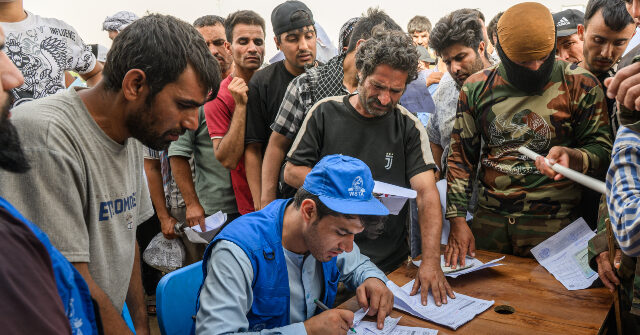Nearly half a million Afghans have returned, either voluntarily or deported, from Iran since June 1, the United Nations migration office revealed this week as Iran’s deadline for Afghans to leave the country was Sunday.
Afghan refugees speaking to local outlets upon their return home described brutal treatment by the Iranian Islamist regime, including beatings, discrimination, and often losing their money and belongings. Many complained that they had passports or other valid documentation to be present in Iran; some had been there for decades before being forced out in the past month. Afghan media reported an increase in anti-Afghan discrimination in Iran after Israel launched “Operation Rising Lion” on June 13, which has no known ties to Afghanistan but was instead a response to Iran dramatically escalating its nefarious nuclear activities and resulted in the elimination of several high-ranking Iranian military leaders.
Iran was believed to have been home to about 4 million Afghan refugees before the waves of mass deportations. The government announced in March that Afghan nationals who were not legally present in the country would have until July 6 to voluntarily depart the country or face deportation. The International Organization for Migration (IOM), a U.N. body, estimated this week that over 900,000 have left the country in 2025, but about half, 449,218, did so between June 1 and July 5.
“So far, 350,000 people have been transported to their villages and provinces across the country. These vehicles are used for the returnee transfers,” Hikmatullah Asifi, an official with the Taliban’s Ministry of Transport and Civil Aviation, told the Afghan outlet Tolo News this weekend. The Taliban, another official with the Ministry of Refugees said, are trying to transfer “roughly 2,000 to 2,500 people” a day away from the Iranian border towards less populated parts of the country.
Among those deported, Tolo News reported on Monday, was a wide variety of Afghans, some of whom had lived decades in the country and accumulated wealth they have now lost, individuals who claimed to be legally present in Iran, and child laborers who described horrific abuses in Iran.
“They treated us very badly. They used to beat and insult me. My childhood was a very bitter experience,” one such child worker, Hussein, told the outlet.
Sayed Ahmad Sadeq, a recently returned Afghan, told Tolo News that Iranians had dramatically escalated their discrimination against Afghans and cited government orders for doing so.
“The bakery refused to give us bread, saying they were instructed by Iranian police not to sell to Afghans,” Sadeq narrated. “Even shopkeepers and market owners have been told to stop buying and selling with Afghans. I personally gave the landlord a ten million toman [$101] deposit for a house, but in the end, we were rejected.”
Another deportee accused Iran of deporting all Afghans regardless of immigration status.
“Everyone is being deported. What is the purpose of this consulate? Why issue visas? This is an official passport, it has a date and everything, but they still tell us to leave,” he asserted, showing Tolo News the passport.
Another deportee lamented to the news agency that “despite having census cards and passports, we were deported,” noting that he was not allowed to keep any of his belongings and lost 280 million tomans ($2828.24), but attempts to contact his landlord and recoup some of his losses have been unsuccessful.
Afghanistan is in a state of acute humanitarian crisis, a product of decades of war. The Taliban jihadist organization has run the country since August 2021, when it seized control of Kabul following the poor management of the U.S. presence in the country by then-President Joe Biden. The Taliban estimated in early June, before the largest waves of Iranian deportations, that over 5 million Afghans had come home since August 2021; the IOM estimated at the time that Afghanistan was home to over 6 million internally displaced people.
The Iranian deportations are the second such waves of mass returns of Afghans to the country since the war ended in 2021, following similar policies by the government of Pakistan. Pakistan announced in October 2023 that all Afghan refugees — nearly 2 million people — had one month to leave the country, or they would face immediate deportation. Taliban spokesman Zabihullah Mujahid complained at the time that Pakistan’s government was being unfair toward the mostly civilian refugees..
“The Pakistani side should reconsider its plan. Afghan refugees are not involved in Pakistan’s security problems. As long as they leave Pakistan voluntarily, that country should tolerate them,” Mujahid said.
The Taliban has been much less publicly outraged by Iran’s deportations. A local governor in Sistan and Baluchestan, Iran, claimed on Sunday that Taliban officials were in direct conversation with Iran regarding the situation. Taliban officials did participate on Sunday at a meeting of the Economic Cooperation Organization alongside Iranian officials, as well as those of other regional countries.
In public, Taliban officials have focused largely on discussing humanitarian plans for resettling the returnees, rather than condemning Tehran.
“Twelve working committees are actively engaged in providing services such as temporary shelter, distribution of food and drinking water,” Taliban Ministry of Economy spokesman Abdul Rahman Habib said this weekend, “healthcare services, cash assistance, transporting returnees to their respective provinces, and supporting their reintegration into society. All available resources are being utilized for this purpose.”
Follow Frances Martel on Facebook and Twitter.
Read the full article here


